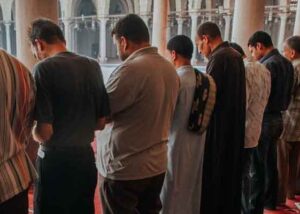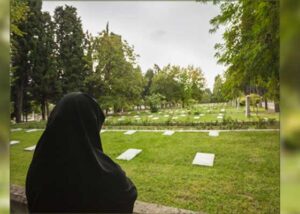Quran
Hadith
Islamic Text
It is not true that the prayer of women is the same as men. Rather there are many differences.
يَا أَيُّهَا النَّاسُ مَا لَكُمْ حِينَ نَابَكُمْ شَيْءٌ فِي الصَّلاَةِ، أَخَذْتُمْ فِي التَّصْفِيقِ إِنَّمَا التَّصْفِيقُ لِلنِّسَاءِ، مَنْ نَابَهُ شَيْءٌ فِي صَلاَتِهِ فَلْيَقُلْ: سُبْحَانَ اللَّهِ
The Prophet ﷺ said, ‘O people, why did you start clapping when something concerned you during the prayer? Clapping is for women. So whoever amongst you is troubled during the prayer, let him say, Subhan Allah.’ (Sahih al-Bukhari, 1234).
As seen in the Hadith above, there are differences between the male and female prayer. Some of the differences between men and women are found in Marfoo (Prophetic) Hadith narrations. Further details are found in narrations from Sahabah (Mowqoof). This is why all four Madhabs of Ahl al-Sunnah establish differences between the male and female prayer.
Many people who claim that there is no difference between the prayer of men and women cite the Hadith below. However, they are obliged to consider other narrations too. It is not permitted to look at Hadith narrations in isolation. When we consider other narrations we find that there are some differences between the male a female prayer. Therefore, it is incorrect to say that the following Hadith is unrestricted. Rather it is a general rule but does have exceptions.
وَصَلُّوا كَمَا رَأَيْتُمُونِي أُصَلِّي، وَإِذَا حَضَرَتِ الصَّلاَةُ، فَلْيُؤَذِّنْ لَكُمْ أَحَدُكُمْ، ثُمَّ لِيَؤُمَّكُمْ أَكْبَرُكُمْ
The Messenger of Allah ﷺ said, ‘Pray as you have seen me pray. When the time for prayer comes, then one of you must call the Adhan, and the oldest amongst you should lead the prayer.’ (Sahih al-Bukhari, 6008).
Many of those who oppose the position of the four Madhabs that a woman’s prayer is different, do agree that she should not recite aloud. Sometimes citing the following Hadith:
عَنْ أَبِي هُرَيْرَةَ رَضِيَ اللَّهُ عَنْهُ، عَنِ النَّبِيِّ صَلَّى اللهُ عَلَيْهِ وَسَلَّمَ قَالَ: التَّسْبِيحُ لِلرِّجَالِ، وَالتَّصْفِيقُ لِلنِّسَاءِ
Abu Hurairah (May Allah Most High be pleased with him) narrated that the Prophet ﷺ said , ‘Tasbih (saying Subhan Allah) is for men and clapping is for women.’ (Sahih al-Bukhari, 1203).
Therefore, those who insist that there is no difference between the male and female prayer, will themselves acknowledge that there are many differences that are unrelated to the postures of Salah. In addition to the above, they will usually accept the recommendation for women is to pray at home. Whereas men are encouraged to pray in the Masjid. Women are not required to pray Jummah (the Friday prayer), whereas it is obligatory upon men.
Due to this, it is fair to say that the Hadith quoted by those who oppose the Madhaahib is not absolute. Rather it has restrictions. So, whenever we find evidence, we will use it. And we will consider it to be an exception. We will not consider it to be in contradiction to the cited Hadith. They must accept this. Since, they have acknowledged exceptions to the generality of the Hadith themselves.
عَنْ يَزِيدَ بْنِ أَبِي حَبِيبٍ، أَنَّ رَسُولَ اللَّهِ صَلَّى اللهُ عَلَيْهِ وَسَلَّمَ مَرَّ عَلَى امْرَأَتَيْنِ تُصَلِّيَانِ فَقَالَ: إِذَا سَجَدْتُمَا فَضُمَّا بَعْضَ اللَّحْمِ إِلَى الْأَرْضِ فَإِنَّ الْمَرْأَةَ لَيْسَتْ فِي ذَلِكَ كَالرَّجُلِ
Yazeed bin Abi Habeeb narrated that the Messenger of Allah ﷺ passed by two women who were praying, and he ﷺ said, ‘When you perform Sajdah then make yourselves compact on the ground. For indeed the woman is not like the man in this regard.’ (Maraseel Abi Dawood, 87).
The Hadith above is Mursal (missing the Sahabi from the chain). There is a difference of opinion amongst scholars regarding the authenticity of the Mursal Hadith. Some have considered it weak and others have not. However, even if we concede, and accept that it is weak, it is still to be considered. Since we are speaking about non-obligatory elements of the prayer. And weak Hadith are used for such issues (see the link below for details). The Hadith is also narrated by Imam al-Bayhaqi:
عَنْ يَزِيدَ بْنِ أَبِي حَبِيبٍ، أَنَّ رَسُولَ اللهِ صَلَّى اللهُ عَلَيْهِ وَسَلَّمَ مَرَّ عَلَى امْرَأَتَيْنِ تُصَلِّيَانِ فَقَالَ: إِذَا سَجَدْتُمَا فَضُمَّا بَعْضَ اللَّحْمِ إِلَى الْأَرْضِ فَإِنَّ الْمَرْأَةَ لَيْسَتْ فِي ذَلِكَ كَالرَّجُلِ
Yazeed bin Abi Habeeb narrated that the Messenger of Allah ﷺ passed by two women who were praying, and he ﷺ said, ‘When you perform Sajdah then make yourselves compact on the ground. For indeed the woman is not like the man in this regard.’ (Sunan al-Kubra, 3201).
The following narrations have also been considered weak, but the same rule applies. Since we are not claiming obligation, rather recommendation, weak Hadith can be used.
عَنْ عَبْدِ اللهِ بْنِ عُمَرَ قَالَ: قَالَ رَسُولُ اللهِ صَلَّى اللهُ عَلَيْهِ وَسَلَّمَ: إِذَا جَلَسَتِ الْمَرْأَةُ فِي الصَّلَاةِ وَضَعَتْ فَخِذَهَا عَلَى فَخِذِهَا الْأُخْرَى، وَإِذَا سَجَدَتْ أَلْصَقَتْ بَطْنَهَا فِي فَخِذَيْهَا كَأَسْتَرِ مَا يَكُونُ لَهَا، وَإِنَّ اللهَ تَعَالَى يَنْظُرُ إِلَيْهَا وَيَقُولُ: يَا مَلَائِكَتِي أُشْهِدُكُمْ أَنِّي قَدْ غَفَرْتُ لَهَا
Abdullah bin Umar (May Allah Most High be pleased with them both) narrated that the Messenger of Allah ﷺ said, ‘When a woman sits in Salah, she places her thigh upon the other thigh. And when she prostrates (makes Sajdah) she connects her stomach to her thighs, in order to conceal herself as much as possible. Indeed Allah (Most High) observes her and says, ‘O My angels, I call you to witness the fact that I have certainly forgiven her.’ (Bayhaqi Sunan al-Kubra, 3199).
وَعَنْ وَائِلِ بْنِ حُجْرٍ قَالَ: قَالَ لِي رَسُولُ اللَّهِ – صَلَّى اللَّهُ عَلَيْهِ وَسَلَّمَ -: يَا وَائِلَ بْنَ حُجْرٍ إِذَا صَلَّيْتَ فَاجْعَلْ يَدَيْكَ حِذَاءَ أُذُنَيْكَ، وَالْمَرْأَةُ تَجْعَلُ يَدَيْهَا حِذَاءَ ثَدْيَيْهَا
Wail bin Hujr (May Allah Most High be pleased with him) said, the Messenger of Allah ﷺ said to me, ‘O Wail bin Hujr when you pray then raise your hands to your ears. As for the woman, she raises her hands to her chest.’ (Tabarani al-Mojam al-Kabeer, 2594).
All of these narrations establish a difference between the male and female prayer with regards to postures. Although some claim that they are all weak. Even if this claim is upheld, it is not a concern. Certainly not from the Hanafi perspective.
Since the Hanafi Imams have said that the difference in the postures is a matter of recommendation, not obligation. And weak Hadith are used for recommendations, as opposed to obligations. This is a well-known principle amongst the scholars of Hadith and Usool (see the link below for details).
One should also consider the fact that weak Hadith may strengthen each other, when they are numerous. So, although the narrations above are speaking about different aspects of the Salah, they are all establishing a difference between the male and female prayer. Therefore, they may strengthen each other from that perspective.
As well as the above Prophetic (Marfoo) narrations, there are narrations from Sahabah (Mowqoof) regarding the same issue:
عَنِ ابْنِ عَبَّاسٍ: أَنَّهُ سُئِلَ عَنْ صَلاَةِ الْمَرْأَةِ؟ فَقَالَ: تَجْتَمِعُ وَتَحْتَفِزُ
Ibn Abbas (May Allah Most High be pleased with them both) was asked about the prayer of a woman. He said, ‘She confines herself and makes herself compact.’ (Musanaf Ibn Abi Shaybah, 2798).
عَنْ عَلِيٍّ قَالَ: إِذَا سَجَدَتِ الْمَرْأَةُ فَلْتَحْتَفِزْ، وَلْتُلْصِقْ فَخِذَيْهَا بِبَطْنِهَا
Ali (May Allah Most High be pleased with him) said, ‘When a woman performs Sajdah let her make herself compact. And she must connect her stomach to her thighs.’ (Musanaf Abd al-Razaq 5072).
عَنْ عَلِيٍّ، قَالَ: إِذَا سَجَدَتِ الْمَرْأَةُ فَلْتَحْتَفِز وَلْتَضُمَّ فَخِذَيْهَا
Ali (May Allah Most High be pleased with him) said, ‘When a woman performs Sajdah let her make herself compact and bring together her thighs.’ (Musanaf Ibn Abi Shaybah, 2797).
And Allah Most High Knows Best.
-Answered by Shaykh Noorud-deen Rashid (16.07.2022)
See also:
Using weak Hadith
Weak Hadith strengthen each other.
No authentic Hadith encouraging women to pray at home.
See also video:






